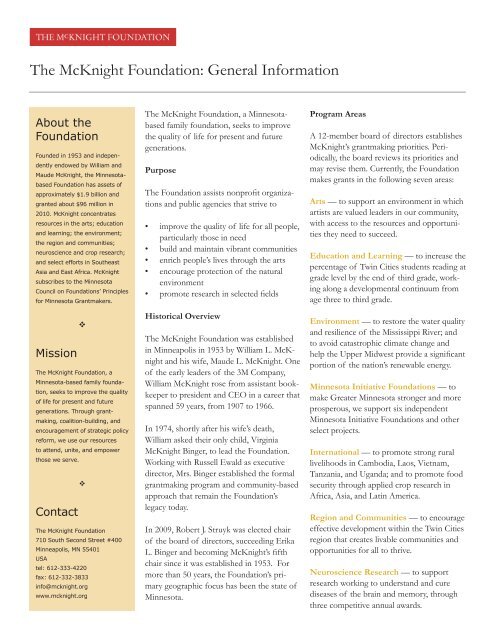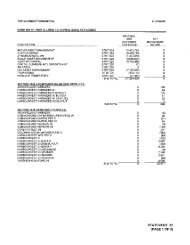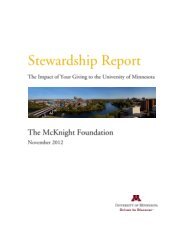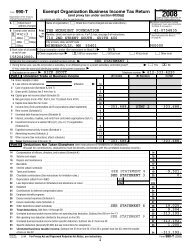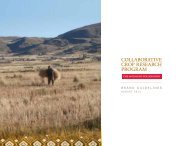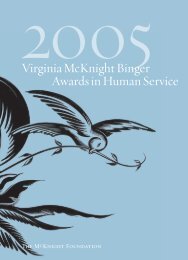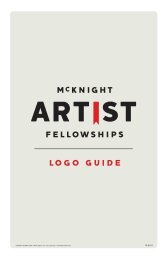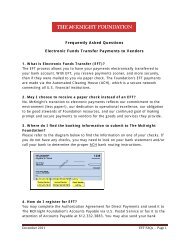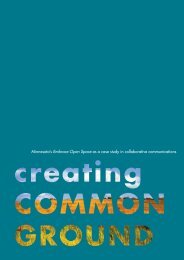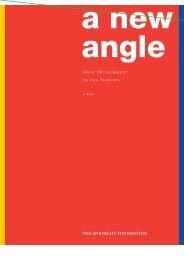PDF (211 KB) - McKnight Foundation
PDF (211 KB) - McKnight Foundation
PDF (211 KB) - McKnight Foundation
Create successful ePaper yourself
Turn your PDF publications into a flip-book with our unique Google optimized e-Paper software.
The <strong>McKnight</strong> <strong>Foundation</strong>: General Information<br />
About the<br />
<strong>Foundation</strong><br />
Founded in 1953 and independently<br />
endowed by William and<br />
Maude <strong>McKnight</strong>, the Minnesotabased<br />
<strong>Foundation</strong> has assets of<br />
approximately $1.9 billion and<br />
granted about $96 million in<br />
2010. <strong>McKnight</strong> concentrates<br />
resources in the arts; education<br />
and learning; the environment;<br />
the region and communities;<br />
neuroscience and crop research;<br />
and select efforts in Southeast<br />
Asia and East Africa. <strong>McKnight</strong><br />
subscribes to the Minnesota<br />
Council on <strong>Foundation</strong>s’ Principles<br />
for Minnesota Grantmakers.<br />
Mission<br />
v<br />
The <strong>McKnight</strong> <strong>Foundation</strong>, a<br />
Minnesota-based family foundation,<br />
seeks to improve the quality<br />
of life for present and future<br />
generations. Through grantmaking,<br />
coalition-building, and<br />
encouragement of strategic policy<br />
reform, we use our resources<br />
to attend, unite, and empower<br />
those we serve.<br />
Contact<br />
v<br />
The <strong>McKnight</strong> <strong>Foundation</strong><br />
710 South Second Street #400<br />
Minneapolis, MN 55401<br />
USA<br />
tel: 612-333-4220<br />
fax: 612-332-3833<br />
info@mcknight.org<br />
www.mcknight.org<br />
The <strong>McKnight</strong> <strong>Foundation</strong>, a Minnesotabased<br />
family foundation, seeks to improve<br />
the quality of life for present and future<br />
generations.<br />
Purpose<br />
The <strong>Foundation</strong> assists nonprofit organizations<br />
and public agencies that strive to<br />
• improve the quality of life for all people,<br />
particularly those in need<br />
• build and maintain vibrant communities<br />
• enrich people’s lives through the arts<br />
• encourage protection of the natural<br />
environment<br />
• promote research in selected fields<br />
Historical Overview<br />
The <strong>McKnight</strong> <strong>Foundation</strong> was established<br />
in Minneapolis in 1953 by William L. <strong>McKnight</strong><br />
and his wife, Maude L. <strong>McKnight</strong>. One<br />
of the early leaders of the 3M Company,<br />
William <strong>McKnight</strong> rose from assistant bookkeeper<br />
to president and CEO in a career that<br />
spanned 59 years, from 1907 to 1966.<br />
In 1974, shortly after his wife’s death,<br />
William asked their only child, Virginia<br />
<strong>McKnight</strong> Binger, to lead the <strong>Foundation</strong>.<br />
Working with Russell Ewald as executive<br />
director, Mrs. Binger established the formal<br />
grantmaking program and community-based<br />
approach that remain the <strong>Foundation</strong>’s<br />
legacy today.<br />
In 2009, Robert J. Struyk was elected chair<br />
of the board of directors, succeeding Erika<br />
L. Binger and becoming <strong>McKnight</strong>’s fifth<br />
chair since it was established in 1953. For<br />
more than 50 years, the <strong>Foundation</strong>’s primary<br />
geographic focus has been the state of<br />
Minnesota.<br />
Program Areas<br />
A 12-member board of directors establishes<br />
<strong>McKnight</strong>’s grantmaking priorities. Periodically,<br />
the board reviews its priorities and<br />
may revise them. Currently, the <strong>Foundation</strong><br />
makes grants in the following seven areas:<br />
Arts — to support an environment in which<br />
artists are valued leaders in our community,<br />
with access to the resources and opportunities<br />
they need to succeed.<br />
Education and Learning — to increase the<br />
percentage of Twin Cities students reading at<br />
grade level by the end of third grade, working<br />
along a developmental continuum from<br />
age three to third grade.<br />
Environment — to restore the water quality<br />
and resilience of the Mississippi River; and<br />
to avoid catastrophic climate change and<br />
help the Upper Midwest provide a significant<br />
portion of the nation’s renewable energy.<br />
Minnesota Initiative <strong>Foundation</strong>s — to<br />
make Greater Minnesota stronger and more<br />
prosperous, we support six independent<br />
Minnesota Initiative <strong>Foundation</strong>s and other<br />
select projects.<br />
International — to promote strong rural<br />
livelihoods in Cambodia, Laos, Vietnam,<br />
Tanzania, and Uganda; and to promote food<br />
security through applied crop research in<br />
Africa, Asia, and Latin America.<br />
Region and Communities — to encourage<br />
effective development within the Twin Cities<br />
region that creates livable communities and<br />
opportunities for all to thrive.<br />
Neuroscience Research — to support<br />
research working to understand and cure<br />
diseases of the brain and memory, through<br />
three competitive annual awards.
2010<br />
Grants Paid<br />
By program area<br />
Environment 28%<br />
Children & Families* 20%<br />
Region & Communities 20%<br />
International 10%<br />
Arts 9%<br />
MN Initiative <strong>Foundation</strong>s 8%<br />
Neuroscience Research 4%<br />
Other 1%<br />
By geographic area<br />
Twin Cities metro 35%<br />
Greater Minnesota 18%<br />
Minnesota, statewide 6%<br />
U.S., outside Minnesota 23%<br />
Global 18%<br />
* Program discontinued in 2010<br />
Who receives these grants?<br />
For our region and communities and arts<br />
programs, grants are awarded primarily to<br />
Minnesota-based nonprofit organizations.<br />
For our environment program, grants are<br />
made mainly in the 10 states bordering the<br />
Mississippi River and in the Twin Cities<br />
region. Our research and applied science<br />
program grants are either national (neuroscience)<br />
or international (collaborative<br />
crop research) in scope. Other international<br />
giving is in East Africa and Southeast Asia,<br />
although grantmaking in East Africa is<br />
through requests for proposals only.<br />
<strong>Foundation</strong>s usually find they can be most<br />
effective by concentrating their resources<br />
within certain topics or geographic areas.<br />
This inevitably means not supporting worthwhile<br />
work in other areas. Generally,<br />
<strong>McKnight</strong> does not support<br />
• grants or scholarships to individuals<br />
• festivals, celebration, or fundraisers; conferences<br />
(except those sponsored by the<br />
<strong>Foundation</strong>); or travel<br />
• medical or health-related services, including<br />
those for chemical dependency<br />
• services for seniors<br />
• services for people with disabilities<br />
How do you apply for a grant?<br />
<strong>McKnight</strong> uses an online application process<br />
for most programs. Visit www.mcknight.org/<br />
apply to get started. Only 501(c)(3) nonprofit<br />
organizations or government agencies are<br />
eligible.<br />
<strong>McKnight</strong> program staff members review<br />
grant requests and present recommendations<br />
to the board of directors. The directors make<br />
decisions at quarterly meetings in February,<br />
May, August, and November.<br />
More information about the <strong>Foundation</strong> is<br />
available on our website at www.mcknight.<br />
org.<br />
v<br />
Questions?<br />
Please visit www.mcknight.org<br />
or call us at 612-333-4220.<br />
September 2011


